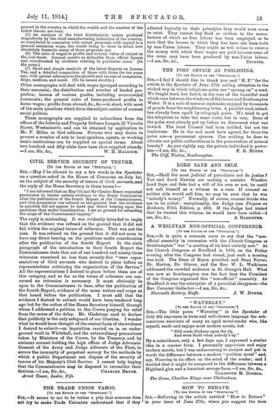CIVIL SERVICE SECURITY OF TENURE.
[To TIIR EDITOR OP 1115 "SPECTATOR...I SIR,—May I be allowed to say a few words in the Spectator
on a question asked in the House of Commons on July 1st, on the subject of the security of tenure of Civil servants, and the reply of the Home Secretary in these terms ?-
"I am informed that on May 7th last Sir Charles Bruce requested permission to tender certain evidence to the Royal Commission after the publication of the fourth Report of the Commissioners, and that permission was refused on the ground that the evidence in question did not appear to have any direct bearing upon the questions then under consideration. I see no ground for extending the scope of the Commission's inquiry."
The reply is misleading. It was evidently intended to imply that the evidence was refused on the ground that it did not fall within the original terms of reference. That was not the case. It was refused on the ground that it did not seem to have any direct bearing on the questions under consideration after the publication of the fourth Report. In the sixth paragraph of the introduction to their fourth Report the Commissioners state that out of one hundred and ninety-three witnesses examined no less than seventy-five "were repre- sentatives of Civil servants who desired to place before us representations criticizing the organization of the Service." All the representations I desired to place before them are of
this category, and so far as the terms of reference are con- cerned no extension is necessary. It must obviously be open to the Commissioners to hear, after the publication of the fourth Report, evidence of the same nature and scope as that heard before the publication. I must add that the evidence I desired to submit would have been tendered long ago but for the action of the Home Secretary himself, through whom I addressed a petition to the Crown praying for relief from the cause of the delay. Mr. Gladstone used to declare that publicity is the only safeguard of our liberties. I wonder what he would have thought of the central facts of the evidence I desired to submit—an inquisition carried on in an under- ground vault in Whitehall, and the extraordinary precautions taken by Ministers of the Crown, by the Treasury, and by
eminent counsel holding the high offices of Judge Advocate- General of the Army and Judge Advocate of the Fleet, to secure the immunity of perpetual secrecy for the methods by which a public Department can dispose of the security of tenure of his Majesty's Civil Service. I cannot help hoping that the Commissioners may be disposed to reconsider their






































 Previous page
Previous page